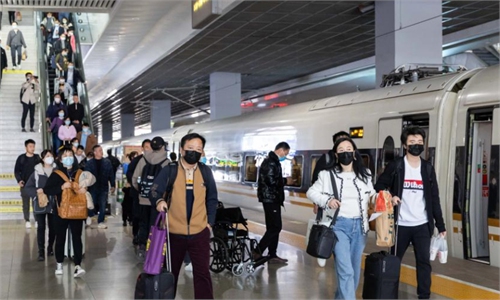ARTS / CULTURE & LEISURE
Holiday extension signals revival of domestic tourism economy

Illustration: Liu Xiangya/Global Times
Recently, the upcoming five-day May Day holiday arrangement has stirred up a heated discussion among Chinese netizens. Some of them called for an additional day off to make the holidays longer like the seven-day National Day and Spring Festival holidays. Meanwhile, the fact that hotel rooms, flight and train tickets are being quickly snapped up shows people's strong desire to travel during the holidays, a sign that China's cultural and tourist sectors are recovering after the COVID-19 epidemic.
May 1 was set as an official one-day holiday from 1949 until 1999 when the holiday was prolonged to seven days, making it one of the three Golden Week holidays together with the aforementioned National Day (on October 1) and Spring Festival. In 2008, another adjustment was made to shorten May Day to three official days, while adding one day off to each of the two folklore holidays - the Qingming Festival and the Dragon Boat Festival.
These adjustments have been closely linked to China's economic development and people's increasing purchasing power. Since China's economy took off in the 1990s, one of the measures to expand domestic demand was to stimulate the cultural and tourist markets. Under the circumstances, the State Council in 1999 adjusted the official May Day holiday for the first time.
However, with further economic and social progress, China began to take traditional culture into serious consideration when setting holidays, highlighted by the inclusion of the Qingming Festival and the Dragon Boat Festival.
The Qingming Festival is the day when people memorialize their ancestors, deceased family members, martyrs and leaders or have an outing in the early spring; the Dragon Boat Festival is the time in the early summer when people compete or attend boat-rowing competitions to commemorate the ancient patriotic poet Qu Yuan. The adjustments for these two festivals won big applause. But it comes at a price that the May Day holidays were reduced to three days.
Past experience shows that too many long holidays would impact the economic performance of the country. If everyone travels during the seven-day holidays, this will trigger problems such as traffic jams, hotel and transportation strain and overcapacity at scenic spots, all situations that would have caused many complaints.
In this sense, keeping the May Day holidays short is a very reasonable and wise decision. It is understandable that some people wish to return to the previous seven-day holidays, but they should also consider domestic conditions.
China is still a developing country and the government has been doing its best to ensure people's livelihoods through development and solving various practical problems. But problems should be solved one at a time. With China's continuous growth, Chinese people will continue to have more time to enjoy their life and leisure.
As the May Day holidays approach, train and air tickets as well as hotel reservations for many hot tourist spots have already been booked solid. According to a recent report, April 29 is expected to be the travel peak, with 395,000 passengers travelling throughout the day, a new record if the numbers prove true.
Ctrip, one of China's main travel platforms, shows that by April 19 long-distance travel accounted for 70 percent of total bookings, 6 percent higher than in 2019. This demonstrates that the Chinese people still have a strong desire for travel that needs to be released.
Apart from visiting scenic spots, tourists have begun exploring some new areas for cultural enrichment. For example, Jiangmen in South China's Guangdong Province became famous thanks to the hit TV drama Knockout that aired during the Spring Festival. According to reports, places in the city where the show was shot had drawn 2.54 million visitors during the Spring Festival, a year-on-year increase of 34.4 percent. The city is now expecting a total of 15 million visitors for the entire year.
Therefore, no matter whether the May Day holidays last five days or seven days, we can clearly see Chinese people's strong desire to travel and enjoy life. This demonstrates that China's tourist and cultural industries have resumed normal operations and are flourishing once again.

